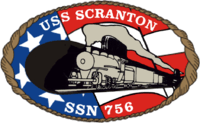USS Scranton (SSN-756)
USS Scranton (SSN-756), a Los Angeles-class submarine, is the second ship of the United States Navy to be named for Scranton, Pennsylvania.
_departs_Souda_harbor_following_a_routine_port_visit_to_Greece's_largest_island.jpg) | |
| History | |
|---|---|
| Name: | USS Scranton |
| Namesake: | City of Scranton, Pennsylvania |
| Awarded: | 26 November 1984 |
| Builder: | Newport News Shipbuilding and Drydock Company |
| Laid down: | 29 August 1986 |
| Launched: | 3 July 1989 |
| Sponsored by: | Mrs. Sarah McDade |
| Commissioned: | 26 January 1991 |
| Homeport: | Naval Base Point Loma |
| Identification: |
|
| Status: | in active service |
| Badge: |
 |
| General characteristics | |
| Class and type: | Los Angeles-class submarine |
| Displacement: | |
| Length: | 110.3 m (361 ft 11 in) |
| Beam: | 10 m (32 ft 10 in) |
| Draft: | 9.4 m (30 ft 10 in) |
| Propulsion: | S6G nuclear reactor |
| Complement: | 12 officers, 98 men |
| Armament: | 4 21 in (533 mm) bow tubes, 10 Mk48 ADCAP torpedo reloads, Tomahawk land attack missile block 3 SLCM range 1,700 nmi (3,148 km; 1,956 mi), Harpoon anti–surface ship missile range 70 nmi (130 km; 81 mi), mine laying Mk67 mobile mine & Mk60 captor mines |
The contract to build her was awarded to Newport News Shipbuilding and Drydock Company in Newport News, Virginia, on 26 November 1984, and construction began on 29 August 1986. She was launched on 3 July 1989 sponsored by Mrs. Sarah McDade, and commissioned on 26 January 1991, with Commander J.G. Meyer in command.
Scranton was the first submarine at Newport News to be built via "modular construction". No keel was laid. In this method, the ship was almost fully built out in individual hull sections. Most of the internal structure, machinery, and piping were loaded in via open ends of the hull sections as each hull section was built out. The individual hull sections were later assembled with exact precision such that piping running between the sections was joined as the hull sections were welded together. The ship was later rolled into a floating drydock and "floated"
In January 2006, Scranton successfully demonstrated homing and docking of an AN/BLQ-11 Long-Term Mine Reconnaissance System (LMRS) unmanned undersea vehicle (UUV) system during at-sea testing under the leadership of Commanding Officer Michael J Quinn.
Operation Odyssey Dawn
On 19 March 2011, the submarine launched Tomahawk cruise missiles at Libyan air defenses as part of Operation Odyssey Dawn.[1]
References
- Burns, Robert, "First wave of allied assault: 112 cruise missiles", Yahoo! News, 20 March 2011, retrieved 20 March 2011.
This article includes information collected from the public domain sources Dictionary of American Naval Fighting Ships and Naval Vessel Register.
External links
| Wikimedia Commons has media related to USS Scranton (SSN-756). |
External links